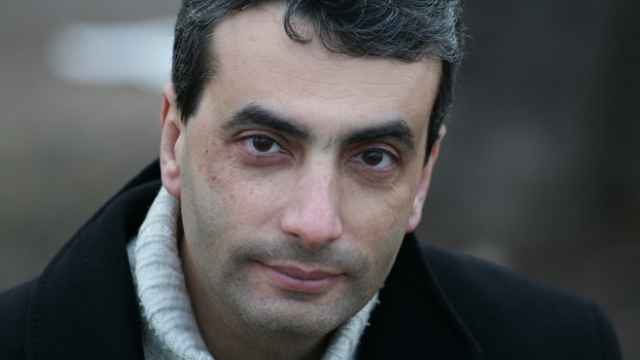A lawmaker and activist in the western Russian city of Pskov who was brutally attacked last week following his inquiries into alleged deaths of Russian soldiers in Ukraine has published material suggesting that up to 80 local paratroopers were killed in an engagement with the Ukrainian army on Aug. 20.
Lev Shlosberg's newspaper, Pskovskaya Gubernia, printed what it claims are verbatim transcripts of conversations between unidentified soldiers currently serving in Pskov's elite 76th Paratrooper Division.
"The conversations are authentic," Shlosberg told The Moscow Times from his hospital bed, where he has been since two unidentified assailants attacked him near his home on Friday. He declined to reveal where the conversations had been recorded or how they had been obtained.
In the expletive-laden exchanges, one of the alleged soldiers recounts how he was wounded in a battle inside Ukraine during which he said 80 of his comrades were killed.
"We're f---king walking along, looking for these f---king Ukrainians. We get out into the open and are seen. Kapow! We're engaged and lured into an encirclement, get it? … We dashed out onto the road, there was a field, sunflowers and a checkpoint. They started to bomb it — bam, bam, bam — and they destroyed it," one of the soldiers says, describing a fatal engagement on Aug. 20 that took place as separatist rebels were being pinned back around their strongholds of Donetsk and Luhansk by the Ukrainian army.
According to the dialogue, the Russians were supported by helicopters and tanks. While the Kremlin has repeatedly denied that Russian troops are directly engaged in support of separatist fighters in eastern Ukraine, Western leaders and Ukrainian President Petro Poroshenko have accused Russia of launching a full-scale military incursion, including the deployment of heavy weaponry.
The dialogues were published Tuesday evening, but the site of Pskovskaya Gubernia crashed immediately because of the volume of traffic, said Shlosberg, who subsequently uploaded the material to his blog.
Shlosberg, 51, who is also a regional lawmaker and a member of the liberal Yabloko party, was one of the first journalists in Russia to write about the funerals of Pskov paratroopers Leonid Kichatkin, 29, and Alexander Osipov, 20, on Aug. 25. According to photographs of their graves, Kichatkin and Osipov were killed the previous week. Relatives of the dead soldiers told Novaya Gazeta newspaper that they were killed near Luhansk.
Four days after the funerals, Shlosberg was found stumbling through the streets of Pskov covered in blood after apparently being assaulted from behind.
"I remember everything up to the moment of the attack," he said, recalling the incident. He said that his memory only resumes two hours later when he regained consciousness in a hospital, and that doctors have not yet said when he might be allowed to go home.
"I link the attack with my speeches, writings and statements about Russian soldiers in Ukraine and their military losses," he said. "It was not just a response to an article in the newspaper, but a response to my position."
Contact the author at h.amos@imedia.ru
A Message from The Moscow Times:
Dear readers,
We are facing unprecedented challenges. Russia's Prosecutor General's Office has designated The Moscow Times as an "undesirable" organization, criminalizing our work and putting our staff at risk of prosecution. This follows our earlier unjust labeling as a "foreign agent."
These actions are direct attempts to silence independent journalism in Russia. The authorities claim our work "discredits the decisions of the Russian leadership." We see things differently: we strive to provide accurate, unbiased reporting on Russia.
We, the journalists of The Moscow Times, refuse to be silenced. But to continue our work, we need your help.
Your support, no matter how small, makes a world of difference. If you can, please support us monthly starting from just $2. It's quick to set up, and every contribution makes a significant impact.
By supporting The Moscow Times, you're defending open, independent journalism in the face of repression. Thank you for standing with us.
Remind me later.






